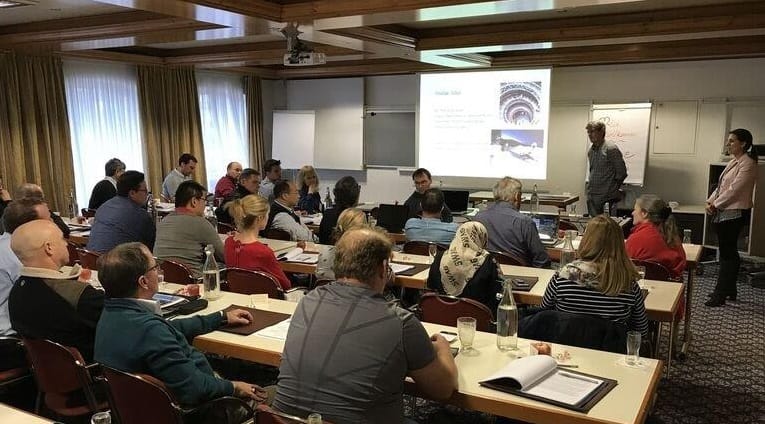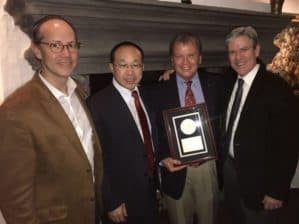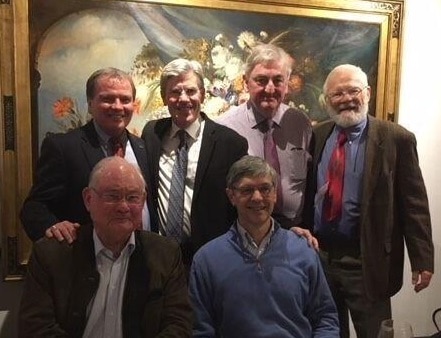
The 18th International Symposium and Workshops on Inner Ear Medicine and Surgery – hosted by the Prosper Ménière Society, along with the UAMS Department of Otolaryngology- Head and Neck Surgery – attracted 60 attendees, including 28 speakers and representation from 18 countries.
It was one of the most well-attended in the symposium’s history.
“Over a year of planning for this event certainly paid off, as it was one of our best meetings to date,” said symposium organizer John Dornhoffer, M.D., chairman of the Department of Otolaryngology-Head and Neck Surgery in the UAMS College of Medicine and Executive Director of the Prosper Ménière Society. “Our esteemed colleagues presented on a broad spectrum of topics, from cochlear implantation to innovative surgical techniques and cutting-edge therapies. There was a lot of enthusiasm at the conference, which is an indication of the current climate of exciting advances in the field.”
The symposium was held March 17-24 at the Hotel Theresa in Zell am Ziller, Austria, which provided a charming backdrop, giving participants the choice of winter sports or relaxation between sessions. Presentations highlighted the latest in the medical and surgical treatment of inner ear disorders, including the diagnosis and treatment of tinnitus and vertigo, as well as cochlear implantation.

Joel Goebel, M.D., F.A.C.S., F.R.C.S., from Washington University School of Medicine in St. Louis, Missouri, was presented with the Gold Medal Award. Goebel is professor and vice chairman of the Department of Otolaryngology-Head and Neck Surgery and director of the Dizziness and Balance Center at Washington University School of Medicine. Goebel’s keynote address was “Ménière’s Disease, Vestibular Migraine and PPPD: What is the Connection?”
The Gold Medal Award is given annually to an individual who has furthered the goals of the Prosper Ménière Society through research excellence, scientific innovation, and far-reaching contributions to the investigation of inner ear disorders.
Goebel is the author of more than 130 peer-reviewed and invited publications and abstracts and the editor of the text “Practical Management of the Dizzy Patient,” second edition. His research interests include clinical studies to refine the Gaze Stabilization and the Video Head Impulse tests, development of a screening history tool for triage of dizzy patients, and the BalCap vibrotactile device for rehabilitation of chronic imbalance.
“It was our honor to recognize Dr. Goebel at this year’s meeting,” Dornhoffer said. “His extensive research and contributions to the treatment of inner ear disorders speaks volumes about his dedication to the field. He is well-regarded among his peers, and it was only fitting that we recognize him in this way.”

Goebel is a fellow of the American College of Surgeons, the American Otological Society, the American Neurotology Society (President 2006-2007), the American Academy of Otolaryngology-Head and Neck Surgery (AAO-HNS), the Triological Society, the Barany Society, the Prosper Ménière Society, and the Association for Research in Otolaryngology. He is currently the chairman of the AAO-HNS Equilibrium Committee and was inducted into the Royal College of Surgeons in 2010.
The next symposium has been scheduled for March 20-28, 2020, and information about abstract submission and meeting registration will be provided on the society website (www.ProsperMeniere.com).
“We certainly hope to build on the momentum of this year’s event while planning the next,” Dornhoffer said. “Hope to see you in 2020.”
The Prosper Ménière Society was founded in 1981 by the International Meniere’s Disease Research Institute (IMDRI) of the Colorado Otologic Research Center (CORC). Its primary goal is to promote the academic dissemination and discussion of clinical research data on Ménière’s disease and all aspects of inner ear dysfunction, pathophysiology, diagnosis and treatment.
